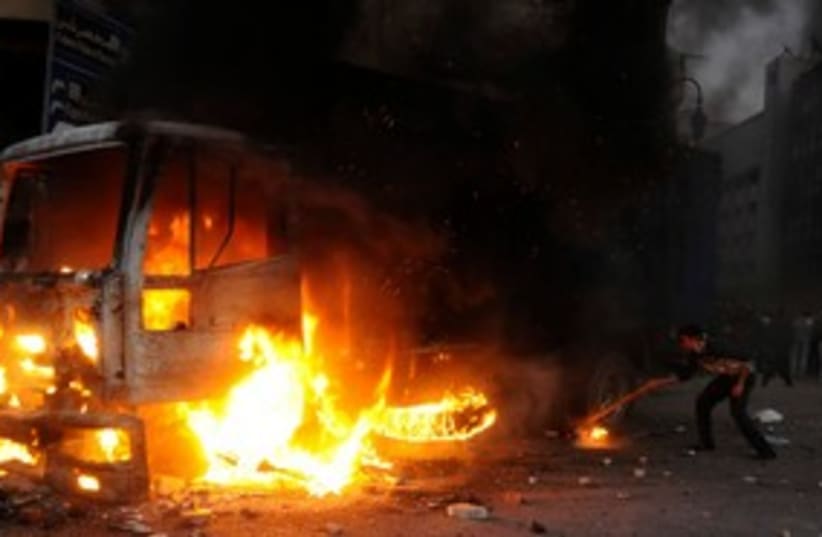Unrest spreads to Alexandria and SuezAbout 5,000 protesters had converged on Tahrir on Saturday afternoon when police tried to evict the remnants of a 50,000-strong demonstration a day earlier, mostly by Islamists demanding the departure of the military.Buildings and two cars in the square were set on fire, witnesses said. A third vehicle close to the Arab League's headquarters was also burned.Police beat the protesters, most of whom were not Islamists, with batons and fired tear gas to regain control of Tahrir, only to retreat after night fell.Protests erupted in other cities. About 800 people gathered in front of the security directorate in Egypt's second city Alexandria and chanted: "Interior Ministry officials are thugs."A witness heard repeated gunfire in the area. It was not clear whether the shots were live bullets. One person covered in blood was carried off to hospital on a motorcycle.About 1,000 gathered outside a police station in the eastern city of Suez, threw stones at it and tried to force their way in. Police fired tear gas and shot into the air.Protesters in Suez tore down banners of former members of Mubarak's disbanded party who are running in the election.Liberal groups are dismayed by the military trials of thousands of civilians and the army's failure to scrap a hated emergency law.Islamists eyeing a strong showing in the next parliament suspect the army council wants to curtail their influence and is maneuveringto stay in power from behind the scenes.
'Two killed, 766 hurt in Egypt street clashes'
Demonstrators call for ruling army council head to go; unrest spreads to Alexandria, Suez; youths chant to "topple the regime."

Unrest spreads to Alexandria and SuezAbout 5,000 protesters had converged on Tahrir on Saturday afternoon when police tried to evict the remnants of a 50,000-strong demonstration a day earlier, mostly by Islamists demanding the departure of the military.Buildings and two cars in the square were set on fire, witnesses said. A third vehicle close to the Arab League's headquarters was also burned.Police beat the protesters, most of whom were not Islamists, with batons and fired tear gas to regain control of Tahrir, only to retreat after night fell.Protests erupted in other cities. About 800 people gathered in front of the security directorate in Egypt's second city Alexandria and chanted: "Interior Ministry officials are thugs."A witness heard repeated gunfire in the area. It was not clear whether the shots were live bullets. One person covered in blood was carried off to hospital on a motorcycle.About 1,000 gathered outside a police station in the eastern city of Suez, threw stones at it and tried to force their way in. Police fired tear gas and shot into the air.Protesters in Suez tore down banners of former members of Mubarak's disbanded party who are running in the election.Liberal groups are dismayed by the military trials of thousands of civilians and the army's failure to scrap a hated emergency law.Islamists eyeing a strong showing in the next parliament suspect the army council wants to curtail their influence and is maneuveringto stay in power from behind the scenes.